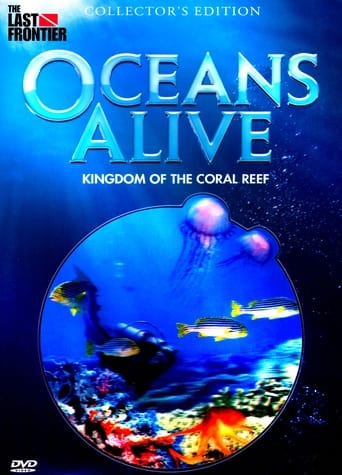
Rating:
0/10 by 0 users
King of the Arctic
John Stoneman and his team move to the Canadian Arctic to study the mighty polar bear in its natural habitat.
Writing:
- Murray Chercover
- John Stoneman
Release Date:
Tue, Jan 11, 2011
Country: US
Language:
Runtime:
Country: US
Language:
Runtime:
Season 1:

Beneath the waters of the Red Sea, biologist Aaron Miroz and marine conservationist and filmmaker John Stoneman study the complex workings of the coral reef community. Here, off the tip of the Sinai Peninsula lies one of the most diverse and prolific coral reefs to be found anywhere on the planet.

Stoneman and his team from the Foundation for Ocean Research study how marine animals live together and how some benefit others in the complex worlds that exist in the coral reef. Using extreme macro photography they are able to film fish being cleaned of parasites by some of their smaller cousins and how even the divers can benefit from this service.

John Stoneman and the members of the Foundation for Ocean Research attempt to record on film all those creatures that can potentially be dangerous to man. Some interesting facts transpire as their studies continue; not the least of which is that in most cases, the so-called dangerous animals of the sea would rather avoid man and when incidents do happen, it is usually when these creatures are forced to defend themselves.

A young diver writes to John Stoneman while she is working on a whale research project in Hawaii. In her letter, the girl explains that she has been so motivated by the work that Stoneman is doing to inform others of the fragile nature of the sea that she would like to devote her life to the same concerns. Moved by the sensitive nature of the letter, Stoneman invites the girl to join him and his crew to assist in their present research. This once in a lifetime opportunity proves to be an exciting learning experience for the neophyte diver and one that she will never forget.

The Foundation crew travels to the Big Island of Hawaii to study how this chain of islands set in the middle of the Pacific, some 2,400 miles from the nearest major landmass first evolved. They also study the diverse marine life that has been attracted to these islands and then later photograph an active volcano, including work that is done beneath the lava flow as it drips into the sea. An experience that is second to none for John Stoneman and his crew.

Stoneman and his crew conduct a detailed study of two types of marine mammals that appear to be at a midway point in their total adaption to the sea: the walking seal, in the form of the sea lion and the crawling seal, as shown by the harp seal. This demanding expedition takes the diving team from the tropical warmth of Mexico to the icy cold of the east coast of Canada, here to dive beneath the ice with these highly specialized animals.

John Stoneman is the guest of the Monterey Aquarium in a study of the West Coast kelp forests and the special marine animals that live in and around them. Observations are made on the playful sea lions of the areas and the sea otter, which has learned how to use a tool, in the form of a rock, to break open its favorite food, the abalone. Stoneman's team also travels to British Columbia to continue their studies, this time on wolf eels and octopus.

The team travels to the Caribbean to observe the tiniest of creatures that are found on the coral reef, including some that can only be found with a magnifying glass. They also test out some new underwater communication devices that enable them to film a most unusual fish, one that is hardly ever seen in the sea.

Aaron Miroz, curator of fish at the Coral World Aquarium in Israel, asks John Stoneman to assist in a shark capture operation for the Aquarium. But first, Stoneman and his crew must study why many fish in the Red Sea are either endemic, or completely the opposite, sharing species with waters halfway around the world. In the process, the expedition leader is able to pick up a stunning record of beautiful, award-winning cinematography.

With over 11,000 dives behind him, spanning more than 30 years; John Stoneman has seen countless numbers of coral reefs and witnessed the changes that have occurred over time due to man's influence and destructive actions. Using videotapes of footage from 25 years ago, his foundation researchers make comparisons between the reefs of the past and those of today. In many cases, they are both surprised and shocked by what they find.

While on a study of polar bears in Canada's north, John Stoneman remembers work he did with other mammals of the sea, including the harp seal, sea lion, sea otter, manatee, dolphin, orca (or killer whale), pilot whale, the mighty humpback whale, and the small, ghostly beluga whale. Of all the underwater creatures, it is the marine mammal that man most identifies with and that becomes true for the Foundation team, too.

Members of the Foundation for Ocean Research search out the secrets of this unique body of water off the coast of Mexico and make observations on sea lions, manta rays and hammerhead sharks.

Examine the efforts being made by various individuals who seek to educate the general public about the fragile nature of the sea. Sequences are devoted to conservationists such as Norine Rouse, Christopher Hartley and Anne Davis, with unique footage devoted to turtles, moray eels and whales.

John Stoneman and his team move to the Canadian Arctic to study the mighty polar bear in its natural habitat.

Stoneman and his team of researchers move into the Canadian Arctic to conduct studies on the white whales of the Arctic: the beluga. Stoneman and Canadian biologist Ned Lynas hope to make a significant contribution to the better understanding of these whales by testing their reactions to underwater recordings.

John Stoneman, accompanied by biologist Dr. Alan Emery, his daughter Kitty and other members of the Foundation for Ocean Research, travel to the jungles of Belize, in Central America to examine the lost culture of the Mayan people, who may well have been the first race to actually farm the marine environment.

The Foundation team travels to islands off the eastern coast of Canada, where they visit the frozen home of the often brutally slaughtered harp seal. There, led by John Stoneman, they observe how baby seals struggle to adapt and survive in such a harsh environment.

John Stoneman and his team join forces with marine biologist Aaron Miroz to execute the safe capture of specimens to inhabit Coral World, a new aquatic park in the Bahamas. to stock the underwater showcase with a wide variety of marine life, the Foundation team must hand capture many animals, including the voracious black tip shark.

While in the notorious Bermuda Triangle, John Stoneman and the Foundation team learn of a missing aircraft that went down with a deadly toxic chemical on-board. They must then dedicate themselves to an exhausting search to retrieve the chemical.

John Stoneman sets out to film the largest grouper known to man, the jewfish (also known as the goliath grouper), which he and his team have not seen for many years. Knowing that these large fish, often weighing 400-500 pounds are prize kills for spear fishermen; he is forced to seek out a remote undersea mountaintop in the hope that spear fishermen have not traveled there.



